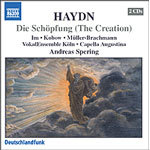
Haydn: Die Schopfung (The Creation)
 $27.00
Out of Stock
$27.00
Out of Stock6+ weeks add to cart
JOSEPH HAYDN
Haydn: Die Schopfung (The Creation)
Sunhae Im (soprano) Jan Kobow (tenor) Hanno Muller-Brachmann (bass-baritone) Christine Wehler (alto) / Cologne Vocal Ensemble / Spering
[ Naxos / 2 CD ]
Release Date: Wednesday 25 May 2005
This item is currently out of stock. It may take 6 or more weeks to obtain from when you place your order as this is a specialist product.
"A brisk, well-sung performance of Haydn's late choral masterpiece"
Editor's Choice Gramophone Magazine (June 2005)
MUSICWEB RECORDINGS OF THE YEAR (2005)
Editor's Choice Gramophone Magazine (June 2005)
"A superb, and energetic, new period-instrument recording of Haydn's late masterpiece, his oratorio The Creation - at Naxos's highly appealing price. Andreas Spering directs a young cast of solo and choral singers in a well-judged performance characterised by nicely sprung tempi, clean textures and some thrilling choral work. All in all, a bargain indeed."
(Gramophone)
Joseph Haydn was born in the village of Rohrau in 1732, the son of a wheelwright. Trained at the choir-school of St Stephen's Cathedral in Vienna, he subsequently spent some years earning a living as best he could from teaching and playing the violin or keyboard, and was able to profit from association with the old composer Porpora, whose assistant he became. Haydn's first appointment was probably as early as 1758 as Kapellmeister to a Bohemian nobleman, Count von Morzin, whose kinsman had once served as patron to Vivaldi. This was followed in 1761 by employment as Vice-Kapellmeister to one of the richest men in the Empire, Prince Paul Anton Esterházy, succeeded after his death in 1762 by Prince Nicolaus. On the death in 1766 of the elderly and somewhat obstructive Kapellmeister Gregor Werner, who had found much to complain about in the professionalism of his young and resented deputy, Haydn succeeded to his position, to remain in the same employment, nominally at least, for the rest of his life.
On the completion of the magnificent palace at Esterháza in the Hungarian plains under Prince Nicolaus, Haydn assumed command of an increased musical establishment. Here he had responsibility for the musical activities of the palace, which included the provision and direction of instrumental music, opera and music for the theatre, as well as music for the church. For his patron he provided a quantity of chamber music of all kinds, particularly for the Prince's own peculiar instrument, the baryton, a bowed string instrument with sympathetic strings that could also be plucked.
Prince Nicolaus died in 1790 and Haydn found himself able to accept an invitation to visit London. There he provided music for concert seasons organized by the violinist-impresario Salomon. A second successful visit to London in 1794 and 1795 was followed by a return to duty with the Esterházy family, the new head of which had settled principally at the family property in Eisenstadt, where Haydn had started his career with them. Much of the year, however, was to be spent in Vienna, where Haydn passed his final years, dying in 1809, as the French armies of Napoleon approached the city yet again.
In London towards the end of May in 1791 Haydn had attended the great Handel Festival in Westminster Abbey, with its thousand performers. The music of Handel was known, of course, in Vienna, where, particularly with the encouragement of Baron Gottfried van Swieten, arbiter elegantium of the Imperial court, the interest of Mozart had been aroused and performances of oratorios had been arranged. The English tradition of Handel performance, however, was something new, suggesting to Haydn a possible return to a form he had explored sixteen years earlier in Il ritorno di Tobia. His madrigal The Storm, setting words by Peter Pindar, won success at its first performance in London in 1792, as it did in Vienna the following year, and further suggested that Haydn might be the true successor to Handel in the composition of oratorios. It was through the impresario and violinist Johann Peter Salomon, who had arranged Haydn's concerts in London, that Haydn came by a possible English text for a new oratorio, a libretto based on the Bible and on Milton's Paradise Lost, apparently by a certain Lidley or Lindley, and once intended, it has been suggested, for Handel. On his return to Vienna he gave the English text to Baron van Swieten, who made a German version, later devising a not always particularly idiomatic English version to match the German words, as set by Haydn. It has been suggested that the English libretto given to Haydn by Salomon simply inspired a new text, but similarity with English textual sources seems to indicate that Baron van Swieten first translated the English text into German, before adapting the English to fit his own German version and Haydn's music. Salomon, however, claimed rights to the text, later relinquishing his claim, although delays in the mail in 1800 put him at a disadvantage over the planned first London performance, which was anticipated by a young rival, John Ashley, who had received his copy of the published work by British Embassy courier. Haydn had worked on the score between 1796 and 1798, and there was a private performance on 30th April in the latter year. The first public Vienna performance, with larger forces, was given at the Burgtheater on 19th March 1799 before a crowded auditorium, an occasion that aroused the greatest public interest and the warmest applause and approval of a work described by one writer as the 'masterpiece of the new musical age'.
